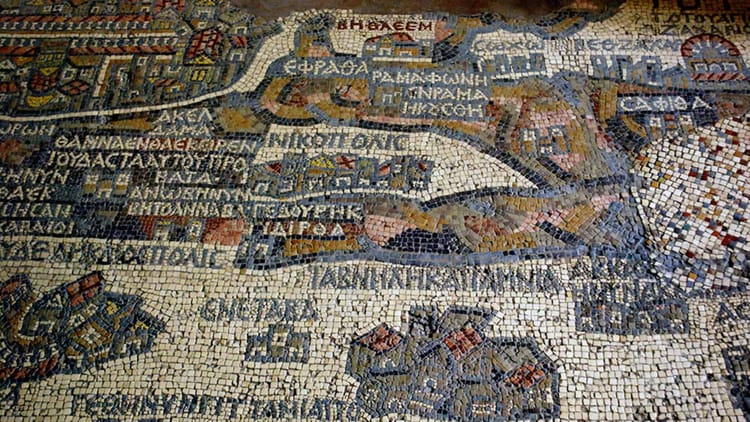The Good News That’s Better Than We Could Imagine (Micah 5:1-6)

Big Idea: The news is bad, but the good news is even better: a king is born from the most insignificant places who sets this world right.
I’ve only been on trial once in my life, and I can’t say I enjoyed it.
It was a traffic court. I thought it would be no big deal. I showed up ready to plead my case. I was one defendant on a long list. Everything was going well until they called the guy before me. I watched as he went down in flames. Eventually the judge revoked his license. The bailiffs came up and cuffed him, and led him to jail. And then they called my name. I was next. I was terrified after seeing what happened to the guy right before me.
If I felt terrified standing before a traffic court judge, imagine what it would be like to stand on trial before a holy God.
The News Is Bad
Today we’re looking at a passage from Micah. Micah was written to Judah some 700 years before Jesus was born. You get an idea of the message of Micah from the first few verses:
Hear, you peoples, all of you;
pay attention, O earth, and all that is in it,
and let the Lord GOD be a witness against you,
the Lord from his holy temple.
For behold, the LORD is coming out of his place,
and will come down and tread upon the high places of the earth.
And the mountains will melt under him,
and the valleys will split open,
like wax before the fire,
like waters poured down a steep place.
All this is for the transgression of Jacob
and for the sins of the house of Israel.
(Micah 1:2-5)
Talk about terrifying. The prophet summons the nations to a trial as defendants. The charge: God’s people have broken their covenant with God. The case: God himself is a witness against his people. The punishment: God will come down himself and destroy Samaria and all the idols.
God’s people were in serious trouble. Their moral condition was not good. The people were guilty of injustice, particularly the upper class. Society was falling apart. Things had become so bad that people couldn’t even trust each other. Five times, the prophet delivers oracles of judgment, including the overthrow of cities, spiritual judgment, socioeconomic judgment, and exile at the hand of the Assyrians.
In particular, Micah castigated the leaders for their failure in chapter 3. “Judges had failed to give justice,” writes James Boice. “Prophets had failed to speak a true word from God. Rulers had ceased to rule. As a result the kingdom was in chaos, and an even greater judgment was coming.”
Let’s pause here. Micah is very relevant to us today. One commentator I read said, “Micah deals with … the development of a commercial and ‘secular’ culture” (John Marsh).
We have seen the emergence of such a phenomenon in the countries of Western Europe and other westernized countries at the end of the twentieth century. There is a similar, though distinctive, story in the USA. In Micah’s time, as in our own, this development led (seemingly inexorably) to a few rich people getting richer, not simply at the same time as the poor becoming poorer, but at the expense of the poor.
If you are concerned about injustice, about the oppression of the poor, and about rich, powerful people abusing their privilege, then the message of Micah — as hard as it is to read — should be one that resonates with you. The good news is that God cares about these things too. God longs for justice for the poor. God takes injustice and evil very seriously.
And that’s very real news for us today. There is so much injustice and evil in the world that we stand in need of God’s judgment. And God always delivers on his judgment because he takes sin and injustice so seriously. Micah issues a warning that the people then needed to hear — and that we need to hear today too.
That’s a big part of the message of Micah: that God will judge his people for their sin and injustice. Micah warned of judgment and exile, and some of that judgment actually happened in the time that Micah ministered.
The Good News That’s Better Than We Could Imagine
It’s in the middle of God’s concern about injustice, and warnings of his judgment, that we come to the extraordinary passage we just read.
On one hand, you’ve got the consequences of sin present in this passage. In the previous chapter, Micah predicted that they would be exiled into Babylon. Now Micah says:
Now muster your troops, O daughter of troops;
siege is laid against us;
with a rod they strike the judge of Israel
on the cheek.
(Micah 5:1)
Okay. That’s bad news. We’re talking about a military siege of Jerusalem, with the king humiliated. It’s in the present tense. Micah calls them to “muster your troops.” But it’s not looking good at all, because Micah also predicts they’ll stick the king with a rod. This is humiliating and horrible news. The leader, the one who is supposed to deliver Israel, is instead defeated and humiliated.
So what actually happened? In 701 BC, the Assyrian army surrounded Jerusalem. They engaged in psychological warfare, getting the people to question their leader, and intimidating the people with their taunts. The residents of Jerusalem had every right to be scared, because the Assyrians had a pretty good win record. We read in 2 Chronicles that God did miraculously deliver Jerusalem from the Assyrian army, and that in a single night the angel of the Lord killed 185,000 Assyrians.
But we also read that just over a hundred years later, in 587 BC, Jerusalem fell after a 30-month siege. Because of famine in the city, resistance was pretty much non-existent. The king was blinded after being forced to watch his sons being killed. Jerusalem was captured and burned and its walls razed. Most of the population was deported and the remainder, mostly rural peasants, were left behind leaderless. The ruling line of David disappeared, and the temple was destroyed. Israel seemed ended forever.
So it’s bad news for Jerusalem, and the leaders aren’t going to be much of a help. In fact, the leaders are part of the problem.
But then we get the good news:
But you, O Bethlehem Ephrathah,
who are too little to be among the clans of Judah,
from you shall come forth for me
one who is to be ruler in Israel,
whose coming forth is from of old,
from ancient days.
(Micah 5:2)
Micah tells us that even though Jerusalem will be conquered, and even though the king will be struck on the cheek, a king will come who meets our deepest expectations and longings. And he will come from the most unlikely of places: not Jerusalem. You can’t trust the kings who are born in Jerusalem, in the centers of power. These kings always failed. This king will come from Bethlehem, a town so insignificant that it’s scarcely mentioned in the Hebrew Scriptures. But from the most insignificant place will come the most preeminent person, a ruler who is coming in the future, and yet is from of old, from ancient times. He is the once and future king.
This king will not come soon enough to help with the siege. Verse 3 says:
Therefore he shall give them up until the time
when she who is in labor has given birth;
then the rest of his brothers shall return
to the people of Israel.
(Micah 5:3)
This verse is a little hard to understand, but Micah seems to be saying that Israel’s situation wouldn’t improve until this ruler came. But when he comes he will do more than even King David was able to do. Verse 4 says:
And he shall stand and shepherd his flock in the strength of the LORD,
in the majesty of the name of the LORD his God.
And they shall dwell secure, for now he shall be great
to the ends of the earth.
And he shall be their peace.
(Micah 5:4–5)
This is the good news of Micah. God will finally send the ruler we need. When he comes, everything will be as God intended it to be in his kingdom: the vulnerable will be cared for, justice will be the norm, and there will be peace in the land.
No matter how bad the good news is of God’s judgment for our injustice, the good news is even better. This is the King we’ve been waiting for. A day is coming when everything wrong will be made right.
I don’t need to tell you how bad the news is today. I spoke to a friend whose wife spends the first part of her day reading the news in bed. By the time she gets up, she’s in a foul mood. The news is horrible and it’s getting worse. We’re going through all kinds of problems: economic, political, medical, personal.
We’re longing for someone to provide the answers for these problems, or at least to get some relief from them. Micah tells us where to look for hope: not to our politicians, not to our economists, not to our doctors, but to a king who is born in the most unlikely of places, whose reign is from old, and who shall be great to the ends of the earth, and will be their peace.
Just as the people under siege longed for this king to come, so we long for this king to reign. We’re longing for the story to unfold of which all the other stories are only a shadow. The new heavens and new Earth are coming in which “everything sad is going to come untrue.”
Who is this king? Jesus. In Matthew 2, Herod asked his scholars where the Messiah was to be born, and based on Micah they told him in Bethlehem. The king that Micah spoke of is the king we who came at Christmas.
Friends, here’s what this passage tells us. The news is bad, very bad. Just look around you. But the good news is even better. A king is born from the most insignificant places who sets this world right. His name is Jesus, and you’re invited to put your hope in him today.
We thank you today for the king born in the most insignificant of places, a ruler whose from old, from ancient days. We thank you that he will shepherd his flock in the strength of the Lord; that he will be great to the ends of the earth; and that he shall be their peace.
We long for this once and future king, and so we pray, “Even so, come Lord Jesus. Your kingdom come, your will be done on earth as it is in heaven.”
And we come to his table now as we look back on his death for us, and as we look forward to his reign over all the earth. In Jesus’ name, Amen.





